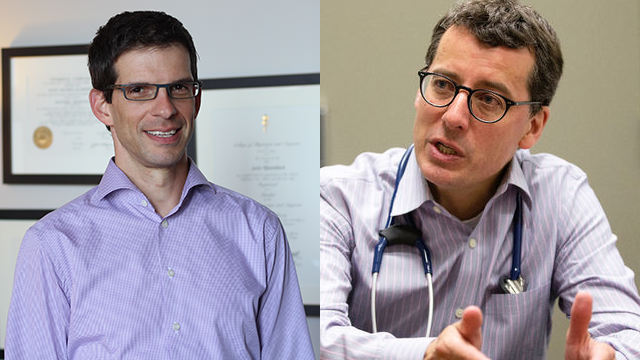
Scott Klarenbach (left) and Branko Braam, Kidney Reserach Chairs. (Braam's photo by Edmonton Sun)
Kidney health poses many questions that have kept scientists and clinicians busy for years-from understanding the complex bonds between kidneys and other organs, to determining the best treatments and technologies that are cost-effective and sustainable for the health care system. Branko Braam and Scott Klarenbach, the two endowed Chairs of Kidney Research and Health Outcomes by the Faculty of Medicine & Dentistry's Division of Nephrology, complement each other's work with ambitious projects on different fronts.
Scott Klarenbach: The numbers behind kidney treatment
Klarenbach, Kidney Health Research Chair - Health Outcomes, has been a member of the FoMD since 2003. He is a nephrologist with a degree in health economics-a very particular combination of disciplines. As a physician, he works with patients on dialysis and does assessments for potential kidney donors. His passion is not only ensuring better patient care for kidney disease and injury, but also studying the most efficient ways for the Canadian health care system to provide care and ensure sustainability.
 "When I was doing my nephrology training, there was a point in time when we had an exponential growth in the number of patients on dialysis," remembers Klarenbach. "Dialysis is a very expensive treatment. One of my mentors commented, 'unless we take ownership of this as physicians and researchers, it's going to be dictated to us what we can or can't do.'"
"When I was doing my nephrology training, there was a point in time when we had an exponential growth in the number of patients on dialysis," remembers Klarenbach. "Dialysis is a very expensive treatment. One of my mentors commented, 'unless we take ownership of this as physicians and researchers, it's going to be dictated to us what we can or can't do.'"
As part of the Canadian National Transplant Research Program (CNTRP), Klarenbach leads the economic arm of the ethical, economic, legal and social (EELS) platform to support research on organ donation and transplantation. Other projects involve analyzing out-of-pocket costs for living donors and patients on dialysis, assessing the cost-effectiveness of alternative dialysis modalities, studying anticoagulants for local governments to determine the best policies for medication reimbursement and cost-effectiveness of extended CPR, among others.
Branko Braam: The connections between kidney and heart
Branko Braam's work evolves in the lab. The Kidney Health Research Chair - Translational Research, Braam mainly focuses on vascular nephrology-the relation between the vascular system and kidney function. Some of the questions he wants to answer are why kidneys with an abnormal amount of fluid can cause high blood pressure, and what happens to the kidneys in case of heart attacks or heart failure.
His research on microvessels, the vascular system and kidney function has kept him very busy for the last 10 years, after he came from the Netherlands to work at the U of A in 2006. His work goes from lab research to clinical studies, in collaboration with several colleagues from cardiology, urology and more. Now with the appointment as Chair, his projects will get a boost in time and funding.
"I believe the whole vascular field is a bit undervalued in the 'kidney world.' I'm starting a project now with transplant physicians to see whether we can obtain more precise measurements of kidney flow for the characterization of people that are willing to donate a kidney," explains Braam. "Quite often we end up in dispute on whether kidneys are really good enough for donation or not, and this is a really difficult decision to make. Using MRIs for innovative microvascular measurements, we can improve the characterization of healthy kidneys and make this decision easier."
The value of Research Chairs: Funding and opportunities of discovery
"In these large university hospitals with so much focus on clinical medicine, it makes it clearer that we must be 'ambassadors' for science as well," says Braam. We should facilitate that other people do research and that we are always open for people to help them."
"I think the chair provides a more visible role in general. Visibility is important because I don't believe in science on a shelf. If you do science that sits on your shelf, then it's not science. It's only science when it's being discussed," adds Braam.
Both researchers seem to share two key areas of focus for the upcoming years: mentoring and growth.
"What I'd love to accomplish-and we are quite far on that route-is to improve our experimental work through an experimental research lab focused on microvascular function and the kidney. We have about 60 per cent of it up and running," says Braam.
"There's a group of researchers in this area that do everything from qualitative research to epidemiology, in different areas like dialysis, transplantation and acute kidney injury. We work as a group. So one of my roles is to mentor and to support their research. I would like to see that at some point I become redundant, that they all become very successful independent researchers that can just carry on with their area of interest. I see myself focusing on research that directly influences policy more and more in the future," adds Klarenbach.